1. Early Life and Background
Joaquim Rodríguez's early life and family background laid the foundation for his future in professional cycling, including the origin of his famous nickname.
1.1. Birthplace and Early Life
Rodríguez was born in Barcelona, Catalonia, Spain. His father was an amateur cyclist in the 1960s, introducing Joaquim to the sport at an early age. He later resided in Parets del Vallès before moving to the Basque Country to ride for Iberdrola, an amateur team affiliated with the professional cycling team ONCE. This move further immersed him in the competitive cycling environment.
1.2. Nickname "Purito"
Rodríguez's well-known nickname in the professional peloton is PuritoSpanish, which translates to "little cigar". The name originated during an early season training camp in his first year as a professional with the ONCE team. As some of his teammates struggled to maintain pace on a small climb, Rodríguez effortlessly passed them, making a hand gesture as if he were smoking a cigar, implying he was climbing with ease. This gesture was not well-received by his teammates, who, as a hazing ritual, later made him smoke a real cigar that evening.
2. Professional Career
Joaquim Rodríguez's professional cycling career spanned from 2001 to 2016, marked by his progression through several teams and a consistent rise to the top ranks of the sport.
2.1. ONCE (2001-2003)
Rodríguez turned professional in 2001 with the ONCE team, having ridden for them as a stagiaire in late 2000. In his debut professional season, he secured his first significant victory by winning the Escalada a Montjuïc, a race held in his hometown of Barcelona. In 2003, he achieved a stage victory at the Paris-Nice and also contributed to team time trial wins for ONCE at the Volta a Catalunya and the Vuelta a España.
2.2. Saunier Duval-Prodir (2004-2005)
In 2004, Rodríguez joined Saunier Duval-Prodir. During this period, he won the Setmana Catalana de Ciclisme, a stage race held in Catalonia. The following year, 2005, proved successful with a victory at the Subida a Urkiola and the Mountains classification in the Vuelta a España. He also secured second-place finishes in the Clásica de San Sebastián and the Vuelta a Burgos.

2.3. Caisse d'Epargne (2006-2009)
Rodríguez moved to Caisse d'Epargne in 2006, where he continued to build his reputation as a strong climber and consistent performer. In 2006, he won the fifth stage of Paris-Nice. The 2007 season saw him claim the Spanish National Road Race Championships, the Klasika Primavera, and the Prueba Villafranca de Ordizia.
In 2008, he showcased his exceptional climbing prowess by winning stage 3 of Tirreno-Adriatico to Montelupone. This 1.1 mile (1.7 km) climb featured sections with gradients over 20%, forcing many cyclists to dismount and run or zig-zag up the ascent, but Rodríguez powered up in a straight line. He also achieved strong finishes in major Classics, placing eighth in the Amstel Gold Race, La Flèche Wallonne, and Liège-Bastogne-Liège. Later that season, he finished sixth overall in the Vuelta a España.
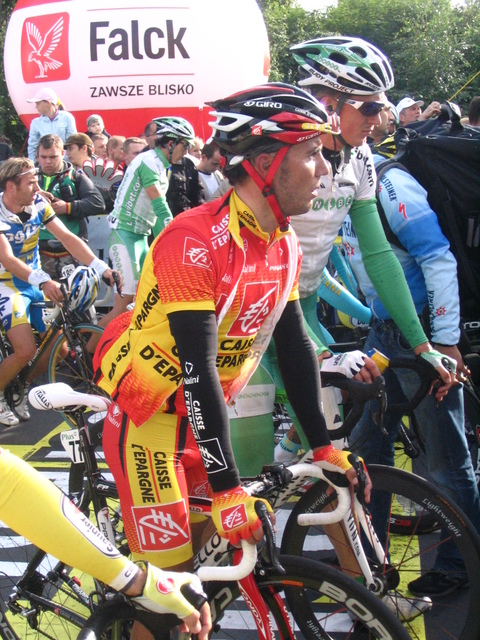
The 2009 season saw him repeat his stage victory at Montelupone in Tirreno-Adriatico. He also finished second in Liège-Bastogne-Liège. The latter half of the year was highlighted by a stage win at the Vuelta a Burgos, a seventh-place finish in the overall classification of the Vuelta a España, and a bronze medal in the World Road Race Championships held in Mendrisio, Switzerland.
2.4. Katusha (2010-2016)
Rodríguez's tenure with the Russian Katusha team marked the most successful period of his career, where he consistently contended for Grand Tour podiums and won multiple World Tour races.
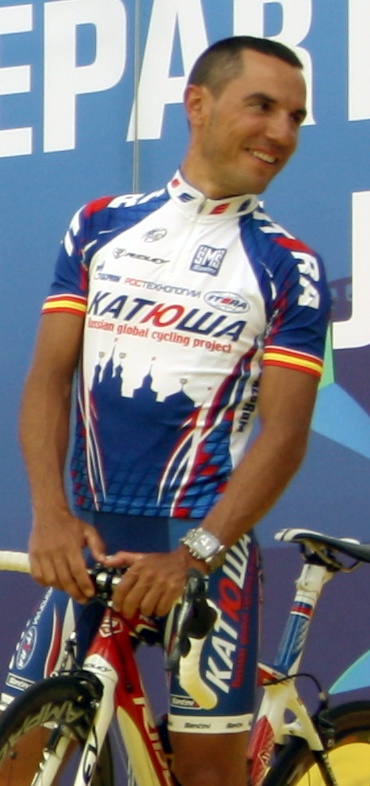
2.4.1. 2010
In 2010, Rodríguez joined Katusha, a move that guaranteed him a position at the Tour de France and a leading role in key races. Early in the season, he won the Volta a Catalunya, a UCI ProTour race, and later the GP Miguel Induráin. He also won a stage at the Tour of the Basque Country, where he finished third overall. He placed second behind Cadel Evans in the La Flèche Wallonne. At the Tour de France, he won the stage to Mende, which featured an uphill finish on the Côte de la Croix Neuve. Rodríguez finished sixth overall at the Tour de France. He continued his strong performance with a fifth place at the Clásica de San Sebastián and a third-place finish in the overall classification at the Vuelta a España, winning the stage to Peña Cabarga. He held the leader's jersey until the final 30 mile (48 km) individual time trial in stage 17, where he lost it to Vincenzo Nibali. Rodríguez concluded the season by topping the UCI World Ranking.
2.4.2. 2011
The 2011 season saw Rodríguez continue his strong form. He won a stage at the Tour of the Basque Country and finished second behind Philippe Gilbert at both the Amstel Gold Race and La Flèche Wallonne. He later placed fourth overall at the Giro d'Italia. In the Critérium du Dauphiné, he won stages to Le Collet d'Allevard and La Toussuire, securing both the points and mountains classifications, and finishing fifth overall. Rodríguez opted to skip the Tour de France to focus on the latter part of the season, particularly the Vuelta a España. He started the second half of the season by finishing third at the Clásica de San Sebastián and winning the overall classification and a stage at the Vuelta a Burgos. In the Vuelta a España, he secured stage victories at Valdepeñas de Jaén and San Lorenzo de El Escorial, where he briefly captured the leader's jersey. However, he eventually faded to finish nineteenth overall. He concluded the season with a third-place finish at the Giro di Lombardia.
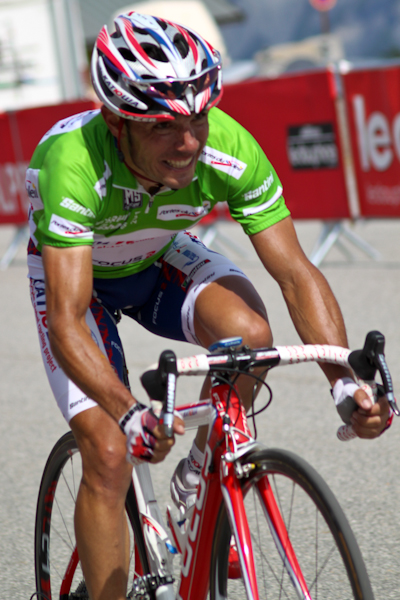
2.4.3. 2012
Rodríguez had a standout year in 2012. On 18 April, he won La Flèche Wallonne in Belgium with a powerful climb on the Mur de Huy, and finished second in the Tour of the Basque Country, winning two stages. He carried his excellent form into the Giro d'Italia, where he won two stages and finished second overall to Ryder Hesjedal. Rodríguez was consistently competitive in the high mountains and held the maglia rosa (pink jersey) entering the final individual time trial. He lost the overall lead by just 16 seconds to Hesjedal, but secured the points classification jersey with a narrow one-point lead over Mark Cavendish.
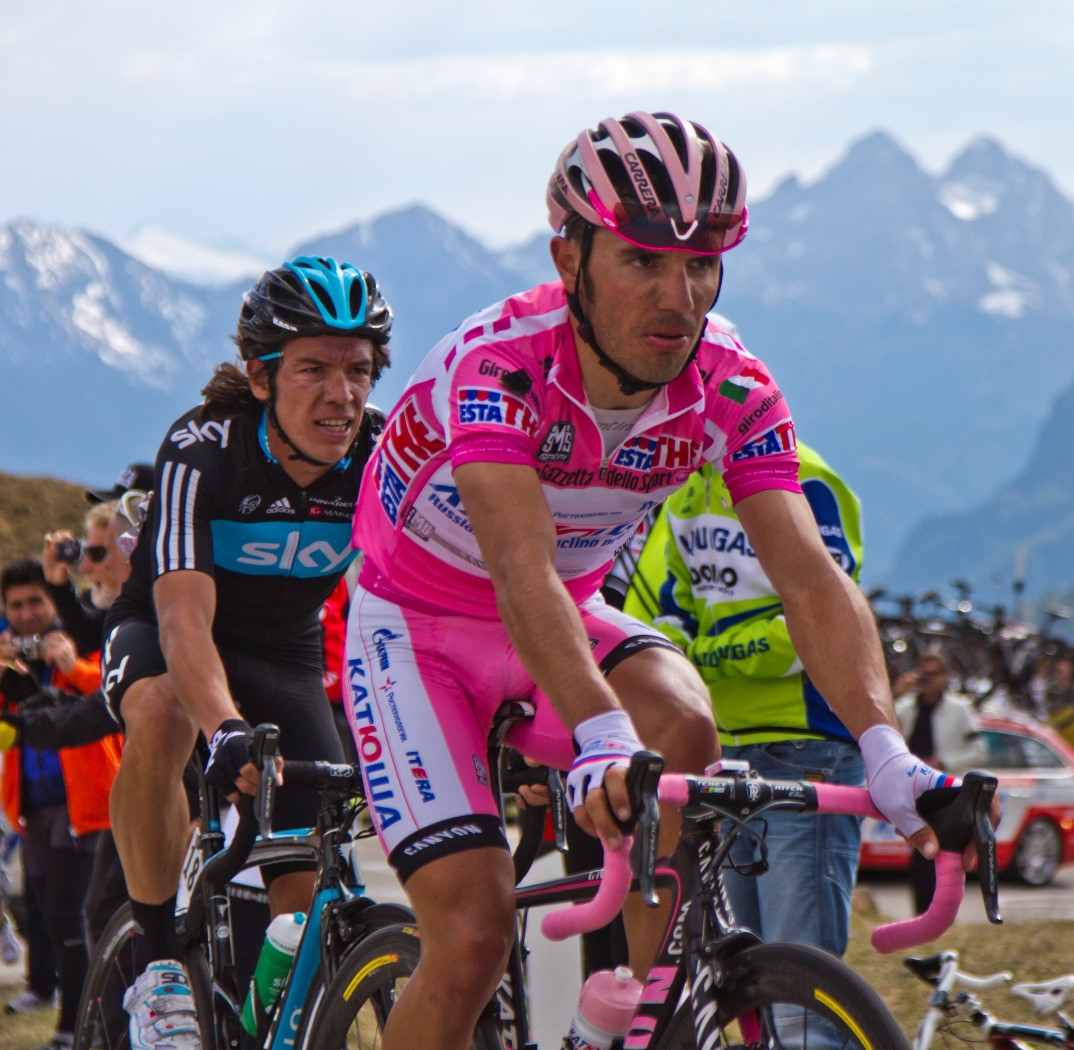
At the Vuelta a España, Rodríguez narrowly missed a stage win on stage 3, being edged out by Alejandro Valverde in a photo finish, who also took the red jersey. However, a major crash involving Valverde on the next stage allowed Rodríguez to take the overall lead. He won stage 6, which concluded with a climb to Fuerte del Rapitán in Jaca. With 1640 ft (500 m) remaining, Chris Froome attacked, but Rodríguez countered, passing the Team Sky rider to claim the victory and a twelve-second time bonus. This scenario repeated on stage 12, where Rodríguez and Alberto Contador broke away on the steep Mirador de Ézaro climb, with Rodríguez pulling away to win by eight seconds. On the mountainous stage 14, Rodríguez again outmaneuvered Contador on the final climb, surging ahead to take another stage win. Disaster struck on stage 17 when Contador launched a successful breakaway, winning the stage solo and relegating Rodríguez to third place overall. Despite his attacks on the penultimate stage up the steep Bola del Mundo, Rodríguez could not improve his third position.
Rodríguez then traveled to Italy to compete in the Giro di Lombardia, where he had the opportunity to claim the first place in the 2012 UCI World Tour from Bradley Wiggins. He achieved this by winning the race in heavy rain and temperatures around 50 °F (10 °C). He attacked on the final climb of Villa Vergano, arriving alone at the top and descending into Lecco to secure victory by a 9-second margin.
2.4.4. 2013
In 2013, Rodríguez began his season by winning stage 4 of the Tour of Oman, ultimately finishing fourth overall. He later won stage 5 of Tirreno-Adriatico and finished fifth overall, gaining time on rivals after following attacks on stage 6. Rodríguez competed in the Volta a Catalunya and Liège-Bastogne-Liège, finishing second in both races behind Dan Martin. He then set his sights on a high finish in the Tour de France.
In the Tour, Rodríguez had a quiet start, sitting eleventh overall after the stage 11 time trial, over five minutes behind the leader. He found his form on stage 15, finishing fourth on Mont Ventoux and moving into the top ten. He later placed third in the uphill time trial stage. On stage 18, he climbed into the top five after finishing fifth on Alpe d'Huez, gaining a minute on race leader Chris Froome. On the mountainous stage 20 to Annecy-Semnoz, he finished second behind Nairo Quintana. Crucially, Rodríguez managed to secure a podium position in the final general classification, finishing third overall after gaining over a minute on Alberto Contador and Roman Kreuziger.
Following the Tour de France, Rodríguez took a break before leading Katusha at the start of the Vuelta a España, a race where he had previously achieved two podium finishes. As one of the pre-race favorites, Rodríguez won stage 19 and finished fourth in the overall classification, more than three minutes behind winner Chris Horner. Afterwards, he competed in the World Championships, where he narrowly missed the rainbow jersey, being caught by eventual winner Rui Costa in the final kilometer. One week later, Rodríguez avenged his defeat by winning the Giro di Lombardia for the second consecutive year, with a perfectly timed attack on the Villa Vergano climb.
2.4.5. 2014
Rodríguez's 2014 season began with the Tour de San Luis, where he finished 71st. He then competed in the Dubai Tour and the Tour of Oman, finishing fourth overall in the latter behind Chris Froome, Tejay van Garderen, and Rigoberto Urán. For the first time in four years, Rodríguez skipped Tirreno-Adriatico, choosing instead to prepare for the Ardennes Classics by training on Teide in Tenerife. He returned to racing at the Volta a Catalunya, winning the third stage and the general classification for the second time in his career. Rodríguez was forced to abandon the Giro d'Italia after a serious crash on stage 6, suffering a broken rib and fractured thumb. He concluded the season by finishing just off the podium, in fourth place overall, at the Vuelta a España.
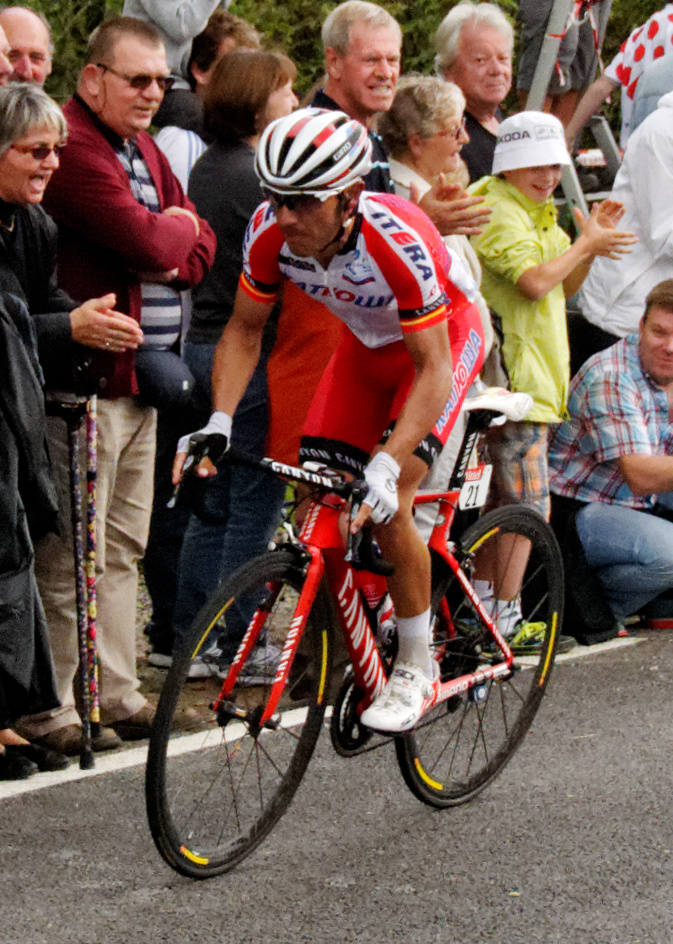
2.4.6. 2015
Rodríguez started his 2015 season somewhat late, taking thirteenth place overall in Tirreno-Adriatico. He achieved his first win of the season on a mountainous stage 3 of the Tour of the Basque Country, outsprinting Nairo Quintana and Sergio Henao. He repeated his winning ways the very next day on the queen stage, winning the sprint after the final climb. In the final time trial, Rodríguez finished second overall, overtaking race leader Henao by 13 seconds to win the race overall. In the Ardennes Classics, Rodríguez finished fourth at La Flèche Wallonne. He then secured a podium spot at Liège-Bastogne-Liège, being outsprinted by Alejandro Valverde and Julian Alaphilippe. In the Tour de France, Rodríguez won stage 3, finishing atop the Mur de Huy. He also won stage 12 atop the Plateau de Beille, marking his first mountain stage victory in the Tour de France.
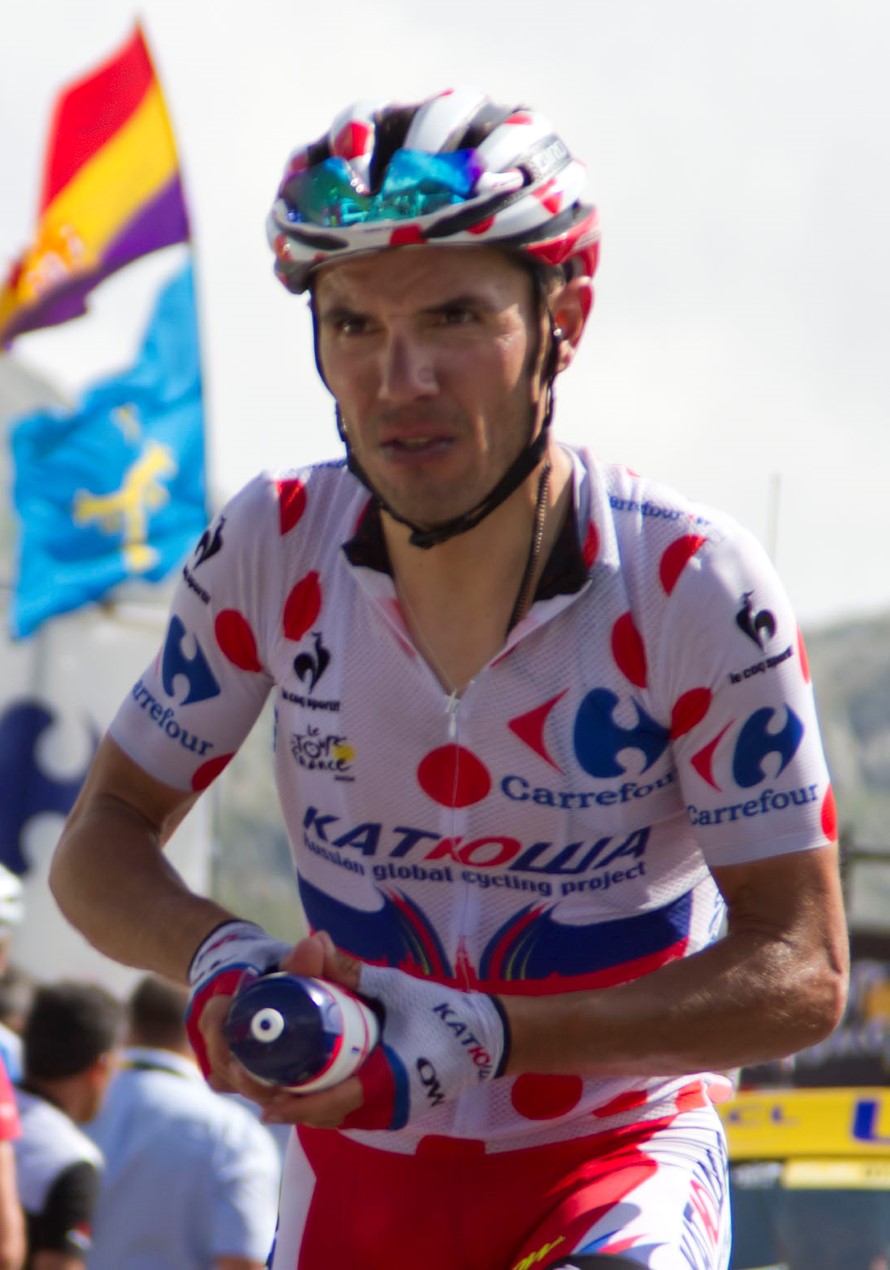
2.4.7. 2016
Rodríguez faced early struggles in the 2016 season, partly due to illness. However, he recovered to achieve a fifth-place finish in the Tour of the Basque Country. His stated goal for the Tour de France was a top-ten finish in the general classification, and his campaign started strongly, holding third place overall after the first stage in the Pyrenees. On the first rest day of the Tour, Rodríguez announced his intention to retire from competition at the end of the season, with plans to compete in the Rio Olympics and the Vuelta a España. His performances dipped slightly in the second week of the Tour, dropping him to twelfth in the general classification. However, he rallied in the final week, attacking on the last mountain stage to Morzine in challenging weather conditions to move up to his final overall position of seventh. On the final stage, Rodríguez was honored by leading the peloton onto the Champs-Élysées to mark his final appearance in the race.
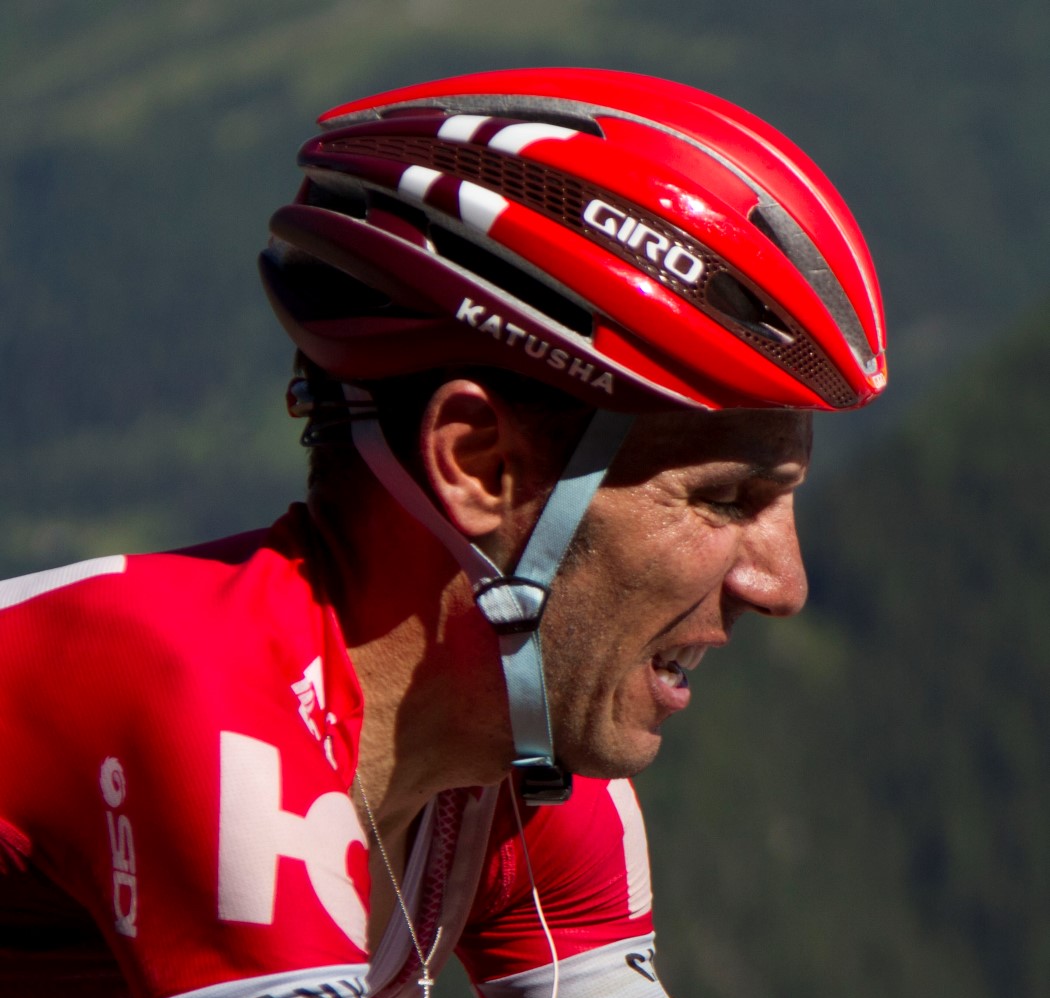
After the Tour, he competed in the Clásica de San Sebastián, where he finished fourth and was recognized as the most aggressive rider. Following this race, he stated it would be his final competition in Spain, ruling out participation in the Vuelta a España. Rodríguez finished fifth in the Olympic road race in his first Olympic appearance. After the race, he confirmed his immediate retirement, rather than continuing until the end of the year. However, in September, it was reported that Katusha would enter Rodríguez into the Trittico di Autunno classics and the Abu Dhabi Tour before his contract expired on 31 December. He did not finish any of the three Trittico di Autunno races, with his final professional race being the Il Lombardia.
In October 2016, it was announced that Rodríguez would join Bahrain-Merida for the 2017 season, initially as a rider before transitioning to a backroom staff role from 2018 onwards. However, Rodríguez announced his retirement once again in December 2016, ultimately deciding not to race in 2017. He subsequently joined Bahrain-Merida's staff as an ambassador for the team.
3. Major Results and Achievements
Joaquim Rodríguez Oliver's career was marked by consistent top-tier performances across various types of races, establishing him as one of the most successful riders of his generation.
3.1. Grand Tour Performances
Rodríguez achieved five overall podium finishes in Grand Tours, demonstrating his consistent capability in multi-week races. He placed second in the 2012 Giro d'Italia and the 2015 Vuelta a España. He secured third-place finishes in the 2010 Vuelta a España, the 2012 Vuelta a España, and the 2013 Tour de France. In total, he recorded fourteen Grand Tour stage victories, including six in the Tour de France, four in the Giro d'Italia, and four in the Vuelta a España. He also held the leader's jersey in both the Giro d'Italia (pink jersey for 10 stages in 2012) and the Vuelta a España (red jersey for 13 stages in 2012, and one stage in 2011 and 2015). His performances consistently placed him within the top ten of Grand Tours, with eleven such finishes throughout his career.
3.2. Classic Race Victories
Rodríguez excelled in the one-day Classic races, particularly those with hilly terrain suited to his climbing abilities. His most significant victories include the 2012 La Flèche Wallonne and the Giro di Lombardia, which he won consecutively in 2012 and 2013. He also achieved multiple podium finishes in other prestigious Classics:
- Second place at La Flèche Wallonne in 2010 and 2011.
- Second place at Liège-Bastogne-Liège in 2009 and 2013.
- Second place at Clásica de San Sebastián in 2005.
- Third place at Giro di Lombardia in 2011.
- Third place at Liège-Bastogne-Liège in 2015.
- Third place at Clásica de San Sebastián in 2011 and 2014.
3.3. Stage Race Victories
Beyond Grand Tours, Rodríguez secured overall victories in several multi-day stage races:
- Volta a Catalunya in 2010 and 2014.
- Tour of the Basque Country in 2015.
- Vuelta a Burgos in 2011.
- Setmana Catalana de Ciclisme in 2004.
He also achieved numerous stage wins in these and other races, including the Tour of Oman, Tirreno-Adriatico, and Critérium du Dauphiné.
3.4. UCI World Rankings and Individual Awards
Joaquim Rodríguez was a dominant force in the UCI World Rankings during his peak, finishing as the world's number one ranked rider in 2010, 2012, and 2013. He also placed second in 2015 and third in 2011. Other notable individual accolades include:
- Spanish National Road Race Championship in 2007.
- Klasika Primavera in 2007.
- Prueba Villafranca de Ordizia in 2007.
- GP Miguel Induráin in 2010.
- Bronze medal at the World Road Race Championships in 2009.
- Silver medal at the World Road Race Championships in 2013.
- Points and Mountains classifications at the Critérium du Dauphiné in 2011.
- Points classification at the Giro d'Italia in 2012.
- Mountains classification at the Vuelta a España in 2005.
- Combination classification at the Vuelta a España in 2015.
- Overall Masters category winner at the Cape Epic mountain bike race in 2019, alongside José Antonio Hermida.
4. Riding Style and Characteristics
Joaquim Rodríguez was renowned for his distinctive and effective racing style, particularly his explosive climbing ability on short, steep gradients. He earned the moniker "King of the Steep Climbs" due to his exceptional power on challenging ascents, often leaving competitors behind on gradients exceeding 20%. This characteristic was evident in his victories on climbs like the Mur de Huy, Montelupone, Peña Cabarga, Mirador de Ézaro, Bola del Mundo, and Plateau de Beille.
Beyond his climbing prowess, Rodríguez was known for his remarkable consistency throughout the season, a quality reflected in his multiple UCI World Ranking titles. He was a rider who could maintain a high level of performance across Grand Tours, one-day Classics, and shorter stage races. Furthermore, Rodríguez maintained a strong reputation as a "clean" rider throughout his career, a quality that earned him respect within the peloton and among fans.
5. Retirement and Post-Retirement Activities
Joaquim Rodríguez's retirement from professional road cycling involved multiple announcements and a brief return to the sport. On the first rest day of the 2016 Tour de France, Rodríguez announced his intention to retire at the end of the 2016 season, with plans to compete in the Rio Olympics and the Vuelta a España before concluding his career. However, following his fifth-place finish in the Olympic road race, he confirmed his immediate retirement, effective immediately, rather than continuing through the end of the year.
In October 2016, there was a brief reversal when it was announced that Rodríguez would join the newly formed Bahrain-Merida team for the 2017 season. The plan was for him to race as a rider for one year before transitioning into a backroom staff role from 2018 onwards. However, in December 2016, Rodríguez ultimately decided against racing in 2017 and re-announced his definitive retirement from professional competition. Following this, he took on an ambassadorial role for the Bahrain-Merida team, contributing to its development and public relations. After his road cycling career, Rodríguez also ventured into mountain bike racing, forming his own team, Andbank-La Purito. In 2019, he won the Masters category of the prestigious Cape Epic mountain bike stage race alongside his partner José Antonio Hermida.
6. Evaluation and Legacy
Joaquim Rodríguez Oliver's career is widely regarded as one of consistent excellence and remarkable resilience. Despite never winning a Grand Tour, his five podium finishes and numerous stage victories in these prestigious races underscore his status as a formidable general classification contender. His ability to consistently challenge for overall victories, often coming within a hair's breadth of the top step, earned him a reputation as a tenacious competitor.
His legacy is further cemented by his success in the one-day Classics, particularly his two victories at the Giro di Lombardia and one at La Flèche Wallonne, which showcased his explosive power on short, steep climbs. Rodríguez's three titles in the UCI World Rankings (2010, 2012, 2013) highlight his consistent performance across the entire professional cycling calendar, making him one of the most dominant riders of his era in terms of overall season-long consistency. Beyond his palmarès, Rodríguez is remembered as a dedicated and clean athlete, a quality that resonated positively with fans and contributed to his enduring popularity in Spanish cycling and the sport at large.